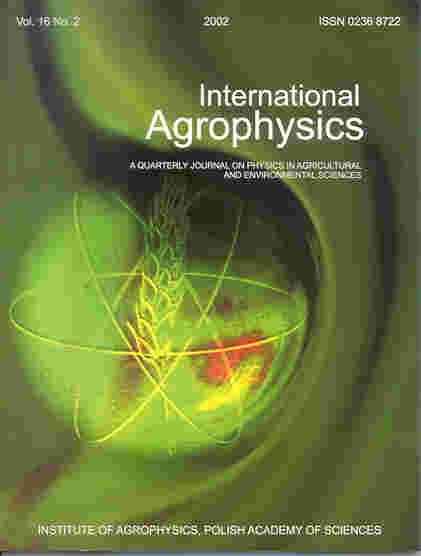|
|
|

|
|
| International Agrophysics |
| publisher: | Institute of Agrophysics
Polish Academy of Sciences
Lublin, Poland |
| ISSN: |
0236-8722 |
vol. 22, nr. 2 (2008)
|
|
|
previous paper back to paper's list next paper
|
|
|
Effect of penetration resistance, bulk density and moisture content of soil on selected yield components of winter triticale in relation to method of cultivation
|
|
| (get PDF ) )
|
|
|
R. Weber , A. Biskupski
|
|
|
Department of Weed Science and Tillage Systems, Institute of Soil Science and Plant Cultivation, Puławy, Orzechowa 61, 50-540 Wrocław, Poland |
|
|
vol. 22 (2008), nr. 2,
pp. 171-177
|
|
|
abstract
The influence of penetration resistance, bulk density and moisture content of soil on winter triticale crop yield was investigated. The crops were grown on land that had not been cultivated for several years, and two methods of cultivation were used: direct sowing and plough-based cultivation. Winter triticale crop yields did not differ significantly regardless of the method of cultivation. Analysis of the coefficients for multiple regression showed that winter triticale crop yield was most dependent on the mass of a thousand grains and the number of grains per ear in the case of plough-based cultivation. In the case of direct sowing, the mass of a thousand grains and the number of ears per 1 m2 had a great influence on the crop yield. Negative partial regression coefficients were obtained for penetration resistance and bulk density of the soil, indicating their inverse relationship to the crop yield. Canonical analysis was used, allowing the determination of the range of effect of penetration resistance, bulk density and moisture content (independent variables) on selected components of winter triticale crop yield (dependent variables) relative to the method of cultivation. The presented canonical analysis showed that the analysed components of the yield were 78% dependent on the three fundamental physical parameters of the soil in the case of plough-based cultivation and 58% dependent in the case of direct sowing. In the case of plough-based cultivation, primarily the penetration resistance and then the moisture content of the soil had the greatest influence on the variability of the components of the crop yield. A high penetration resistance and a reduced moisture content caused a reduction in the1000-seed weight. In the case of direct sowing, the moisture content of the soil affected the variability of the number of ears per unit of land surface.
|
|
keywords
penetration resistance, moisture, soil bulk density, yield components
|
|
|
|
|
|
|